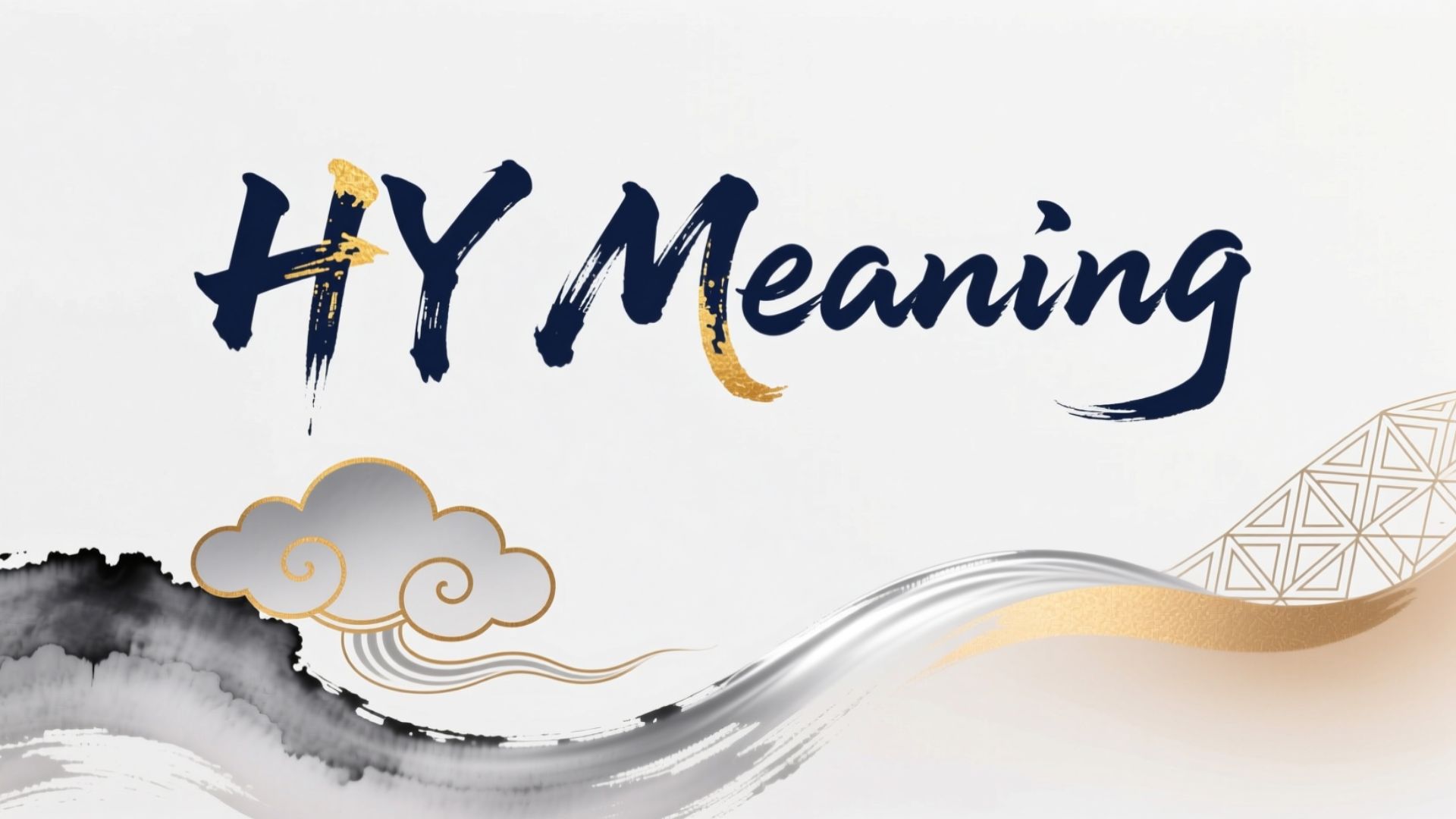The internet loves abbreviations. They save time, feel casual, and sometimes even add personality to messages. One abbreviation you may have stumbled upon, especially in social media captions or updates from creators, is HY. People often ask: What does HY mean in text? Does it stand for “Hi” or “Hey,” or does it have a deeper meaning?
The short answer is this: HY usually means “hiatus.” But there’s more nuance behind it. In this article, we’ll break down HY meaning, where it shows up, how it connects to the word “hiatus,” and when you should (and shouldn’t) use it. We’ll also give you 11 solid alternatives to “hiatus” with examples, so you’ll always know the right word for the right setting.
What Does HY Mean?
The abbreviation HY most often stands for “hiatus.” This shorthand became common in online spaces like fandom communities, YouTube, Wattpad, and even professional creative platforms.
When people ask what do HY mean in text, the explanation is simple: it signals someone is taking a break from posting, working, or showing up online. Let’s dig into the main contexts.
HY = Hiatus (Most Common Use)
In online conversations, HY is the quick way to announce a pause. For example, a content creator may post “Going on HY for a few weeks” to signal they won’t be active. The two-letter abbreviation is faster to type than the full word and still gets the point across to followers who understand it.
HY in Text Messaging
When you see HY meaning in text, it often means someone is casually telling you they’re stepping away. It’s less formal and usually used among friends, peers, or within tight-knit communities.
Example:
- “Can’t talk much these days, on HY.”
- “Writer’s block hit me hard, HY for now.”
Notice how it doesn’t need explanation if both sides already share the shorthand.
HY in a Professional Context
In professional settings, HY meaning text can get tricky. While the abbreviation might make sense in social circles, it risks confusion in the workplace. Unless everyone in the group understands it, “HY” may come off unclear or even unprofessional. In those cases, spelling out “hiatus” or choosing a formal alternative is much safer.
What Does “Hiatus” Mean?
To fully grasp HY meaning, you need to understand “hiatus.” The term has roots in Latin, originally meaning “opening” or “gap.” In modern usage, it refers to a temporary pause or break.
Key elements of “hiatus”:
- Temporary: It doesn’t imply permanence, only a pause.
- Flexible use: Can describe breaks in work, education, entertainment, or daily life.
- Neutral tone: Neither positive nor negative by itself.
Examples in everyday life:
- A TV show goes “on hiatus” between seasons.
- A musician announces a tour hiatus to rest.
- A student takes a hiatus from classes to deal with personal matters.
When and Why Do People Use HY or “Hiatus”?
Different communities have different habits, but the core idea remains: HY signals stepping back.
Here are the main scenarios where you’ll see it:
- Content creators: YouTubers, streamers, and bloggers use HY to notify their audience they won’t upload for a while.
- Social media updates: Instagram bios, Twitter (X) posts, or TikTok captions often contain “HY” to let followers know someone is less active.
- Workplace or academic leave: While less common, some may write HY in group chats when taking unpaid leave or study breaks.
- Mental health and self-care: A growing number of people openly use HY to normalize breaks for emotional or psychological wellbeing.
11 Strong Alternatives to “Hiatus” (With Examples)
The word “hiatus” can feel dramatic or too formal in some contexts. That’s why people often look for alternatives. Below are 11 options you can use instead of “hiatus,” complete with examples to help you choose wisely.
| Alternative | When to Use | Example Sentence |
|---|---|---|
| Break | Simple, casual | “I’m taking a short break from Twitter.” |
| Time Off | Workplace or casual | “I need some time off after this project.” |
| Pause | Neutral, short-term | “Let’s pause uploads for two weeks.” |
| Sabbatical | Academic, professional | “She’s on a sabbatical to finish her research.” |
| Downtime | Relaxation focus | “The company scheduled downtime next month.” |
| Breather | Informal, casual | “I need a breather after finals.” |
| Mental Health Break | Emphasizes wellbeing | “He’s on a mental health break from social media.” |
| Recess | Academic, playful | “We’ll reconvene after a recess.” |
| Intermission | Entertainment, events | “The concert had a 15-minute intermission.” |
| Cooling-Off Period | Conflict or decision-making | “The board called for a cooling-off period.” |
| Leave of Absence | Formal, workplace | “She filed for a leave of absence due to health.” |
Choosing the Right Alternative (Context Matters)
The word you choose depends heavily on tone and setting. Here’s a breakdown.
Casual Conversations
- Break, pause, breather work best.
- Example: “I’m taking a breather after exams.”
Social Media Updates
- Hiatus, time off, break feel natural.
- Example: “HY until October, need time off.”
Professional Emails or Workplace
- Use leave of absence or sabbatical.
- Example: “I’ll be on a leave of absence for three months.”
Academic or Creative Work
- Intermission, recess, sabbatical.
- Example: “The journal is on recess until spring.”
Tone & Word Choice: Why It Matters
Language shapes perception. Saying “HY” to your YouTube audience feels light and approachable. Writing “leave of absence” in an HR request shows professionalism. Both describe a break but carry different weight.
- Casual tone builds connection with friends or followers.
- Formal tone protects credibility in workplaces and academia.
- Balanced tone works in mental health discussions, where clarity and empathy matter.
A quick tip: read the message out loud before sending. Does it sound like something you’d comfortably say in that setting? If not, adjust the wording.
Should You Use HY or Spell Out “Hiatus”?
This depends on who you’re addressing.
- Use HY if your audience already understands it. Social media fans, close friends, or niche communities will get it instantly.
- Spell out hiatus in formal writing, workplace emails, or mixed-audience posts. It avoids confusion and looks more polished.
Remember: clarity always beats cleverness.
FAQs
What does HY mean on Instagram?
It usually means “hiatus,” signaling the person is less active or on a break from posting.
Is HY a formal term?
No. HY is informal shorthand and should not be used in official documents or professional communication.
Can I say HY in a work email?
It’s not recommended. Spell out “hiatus” or use “leave of absence” instead.
What’s a short word for hiatus?
“Break” or “pause” are common short alternatives.
Is HY commonly used in texting?
Yes, especially among younger users and content creators. HY meaning in text is widely recognized as “hiatus.”
What’s the best professional way to say hiatus?
“Leave of absence” or “sabbatical,” depending on the context.
Should I use HY in content creation updates?
Yes, if your audience understands it. For new followers, consider spelling out “hiatus” at least once.
Conclusion
So, what does HY mean in text? It almost always stands for “hiatus,” a shorthand that signals someone is on a break. Whether it’s a YouTuber announcing downtime, a student stepping away from classes, or a friend pausing conversations, the meaning remains consistent.
But here’s the key: the context matters. In casual settings, HY works fine. In professional or academic spaces, alternatives like leave of absence or sabbatical are far better choices.
The next time you see HY in a caption or message, you’ll know it’s not just two random letters—it’s a quick signal that someone is recharging, refocusing, or simply stepping back for a while.

“Welcome to the ultimate destination for the best Instagram captions! I’m Masood, your go-to guide for crafting the perfect caption to match any moment. Whether you’re posting a selfie, a scenic shot, or a fun group picture, I’ve got you covered with creative, catchy, and relatable captions for every occasion. Dive into my collection and discover the perfect words to express yourself on Instagram!”





